Israeli’s frustration with Netanyahu builds as war hits nine months
Israelis take to the streets to call for new elections and for the government to secure the release of hostages
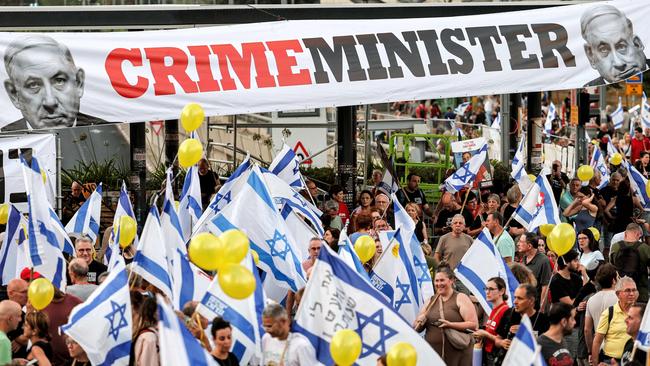
Thousands of Israelis took to the streets on Sunday to protest Prime Minister Benjamin Netanyahu’s government, a sign of growing discontent with the Israeli leader’s war management and failure to secure the release of hostages held in Gaza as the war marked its ninth month.
Protesters gathered in the sweltering heat to block main thoroughfares across Israel, waving Israeli flags while congregating in key intersections in Tel Aviv, Jerusalem, Haifa, and other cities. The demonstrations were intended to bring normal life to a halt and signal frustration on the nine-month anniversary of Hamas’s Oct. 7 invasion of southern Israel, in which 1,200 people were killed and about 250 taken hostage, according to Israeli authorities.
Many protesters called for fresh elections, holding signs with messages for Netanyahu such as, “you’re the head, you’re to blame,” and calling his coalition a “government of destruction.” Others focused their message on returning the 116 hostages taken by Hamas who still remain in Gaza. “We are all hostages,” read one sign hoisted in the air, as crowds chanted “bring them home now.” The protest spilt over onto quiet streets, with cafes across Tel Aviv dotted with signs calling for “a deal now.”
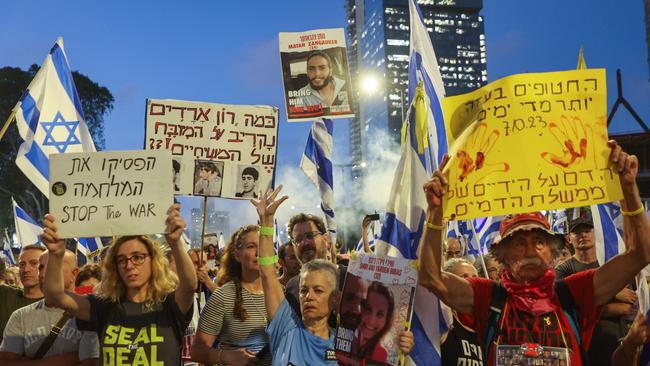
Outside of the military’s Tel Aviv headquarters, a man on the street lay covered in red paint to simulate blood next to a scribbled message that said, “we are all hostages.” Above him protesters had draped a banner emblazoned with hostages’ faces and reading, “deal or a death sentence.” In the crowd, Sharon Huderland, 72 years old, parked her wheelchair and held a sign that read “enough.” She came to protest against both Netanyahu’s government and the stalled deal with Hamas, which she thought were interlinked. “It’s our second war of independence,” Huderland said.
The co-ordinated wave of protests came days after ceasefire negotiations restarted with the U.S.-designated terrorist organisation Hamas, the latest round in a monthslong series of faltering talks to end the fighting in exchange for the release of hostages. Israeli officials and Arab ones mediating the talks said there was renewed momentum following their meeting in Doha on Friday. The officials stressed that gaps remain to be bridged before a deal can be closed. Israel said that negotiating teams are slated to meet again this week.
Netanyahu’s office on Sunday reiterated Israeli demands for a deal, stipulating in one that Israel can resume fighting any time to complete its war goals. Hamas has rejected that demand in previous talks. The Prime Minister’s Office also said that Israel would seek to maximise the number of living hostages released under an agreement, won’t allow armed militants to return to northern Gaza and won’t permit weapons smuggling from Egypt into Gaza via their shared border.
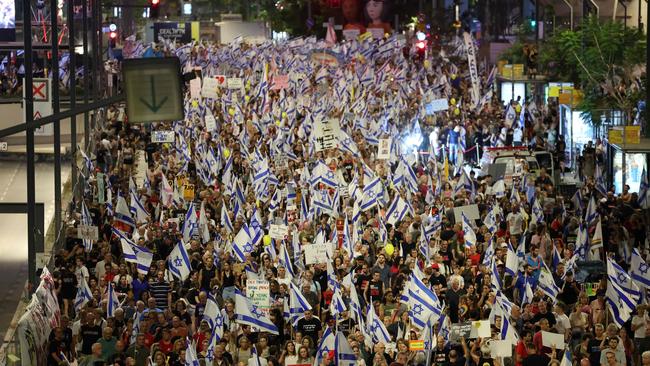
The protests are pressuring Netanyahu’s government, which is already facing falling approval ratings, infighting and international investigations at the International Criminal Court and International Court of Justice over its prosecution of the war in Gaza. More than 38,000 Palestinians have been killed in Gaza, most of them civilians, according to Palestinian health authorities, whose numbers don’t say how many were combatants. A June order by Israel’s Supreme Court to begin drafting ultra-Orthodox religious students into the military threatens to pit the coalition’s religious parties against politicians who think it is critical to broaden Israel’s draft base. It is one of many domestic fights testing Netanyahu’s thin parliamentary majority.
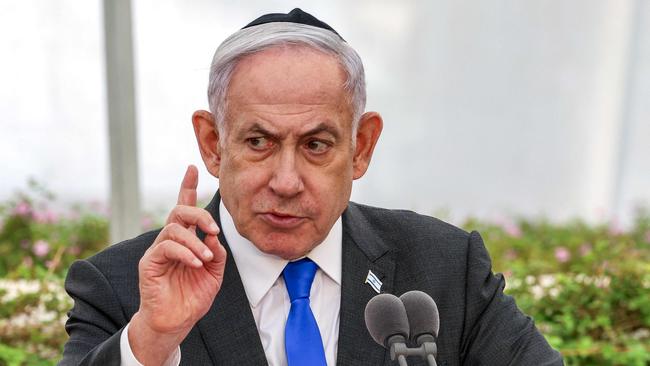
But the government is rebuffing pressure to step down, knowing that it would emerge with a weaker parliamentary position in the event of a new election, said Tamar Hermann, a senior research fellow at the Israel Democracy Institute in Jerusalem.
“Is this going to topple the government? My answer is no,” said Hermann of recent demonstrations. But “this is something very, very critical to show the government that a significant segment of the public aren’t satisfied.” Israelis are increasingly sceptical that their government can achieve its war goals of uprooting Hamas’s civil and military control over the Gaza Strip and returning hostages, according to recent polling. Fifty-eight per cent of Israelis in a Friday poll conducted by the news station Channel 12 think Israel is far from reaching Netanyahu’s promise of total victory, and a similar percentage, 54%, think that Netanyahu is continuing to fight the war because it serves his political interests.
A majority is also emerging in Israel in support of giving priority to hostage releases. The same poll found that 67% of Israelis think freeing hostages is more important than continuing to battle Hamas.
The Israeli military’s chief spokesman has said that a diplomatic solution is most effective for releasing hostages, and on Sunday, Defense Minister Yoav Gallant called for a deal amid the protests. “It is a sensitive moment — we need to make a deal to return the hostages,” Gallant said, blaming Netanyahu for politicising a deal. Netanyahu has said he is not blocking an agreement.
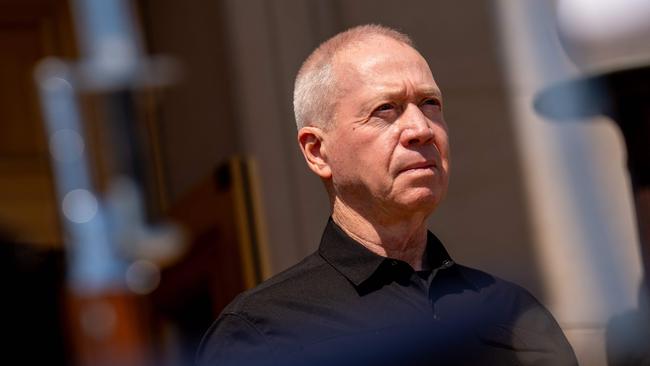
Yet many families of hostages held in Gaza feel abandoned by the government. Lee Siegel said he feels that the Israeli government isn’t giving priority to a deal that would release his brother Keith, 65, an American-Israeli dual citizen kidnapped from his home in southern Israel alongside his wife, Aviva, on Oct 7. Aviva was released in November as part of a week long ceasefire deal that freed 105 hostages, before the arrangement collapsed.
“It has become very clear over the last number of months that the release of the hostages isn’t the priority of the Israeli government,” Siegel said. “Since those seven days of release through diplomacy we’ve been stuck.” Families of Israeli hostages say that if a deal isn’t closed soon, more of their loved ones will likely die.
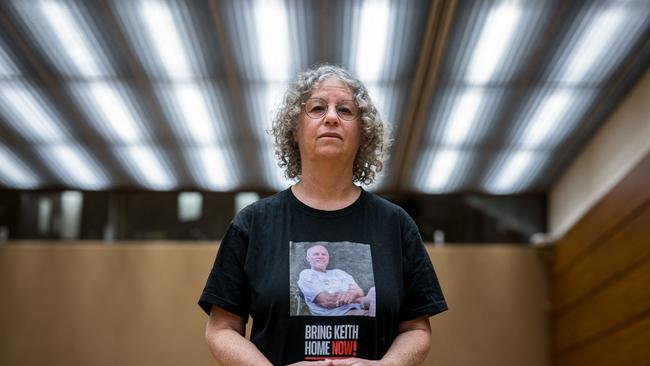
“Now is the last chance,” said Alon Gat, whose sister Carmel is still held by Hamas in Gaza after being kidnapped from their parents’ home on Oct. 7. “I’m not sure my sister and the other hostages can last” if talks collapse, he said.
Many hostages have died while in Hamas captivity, some as a result of Israeli air strikes and operational activity, according to people familiar with U.S. intelligence. Mediators in the talks estimate that as few as 50 of the 116 hostages still remaining in Gaza are still alive, although Israel only publicly acknowledges that 42 are dead.
Keith raised his four children “with the values of you serve your country, you serve in the army, you put your lives at risk for your country,” said his brother Lee. “And here we are nine months later and he’s still a hostage in Gaza.”
The Wall Street Journal

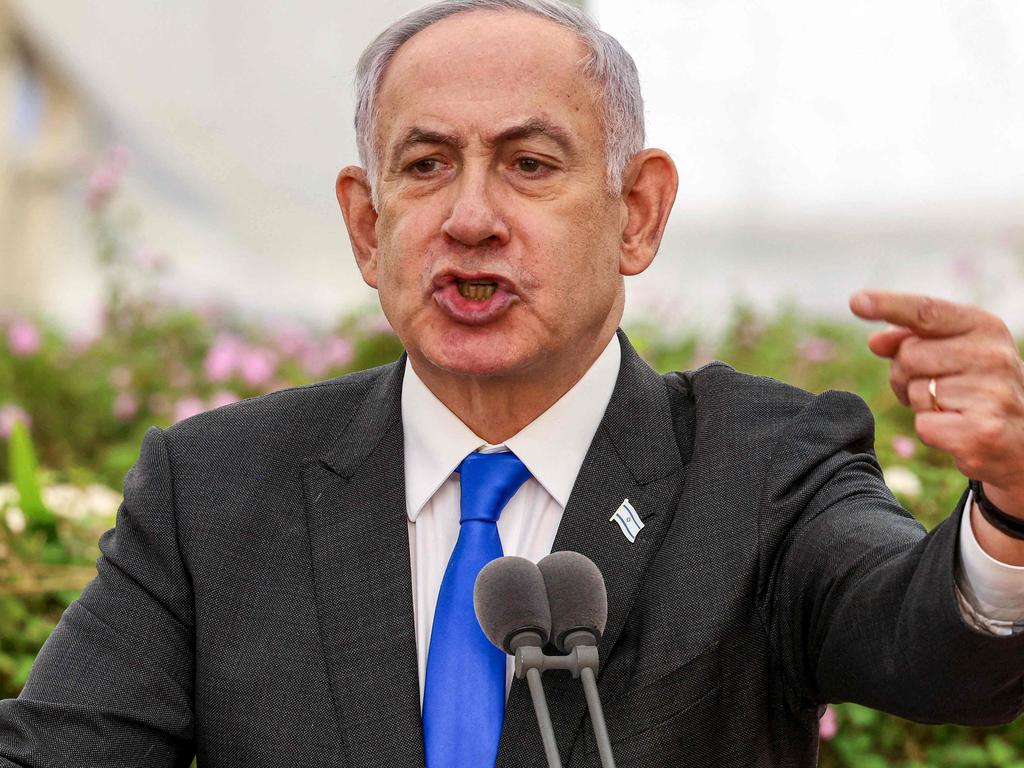


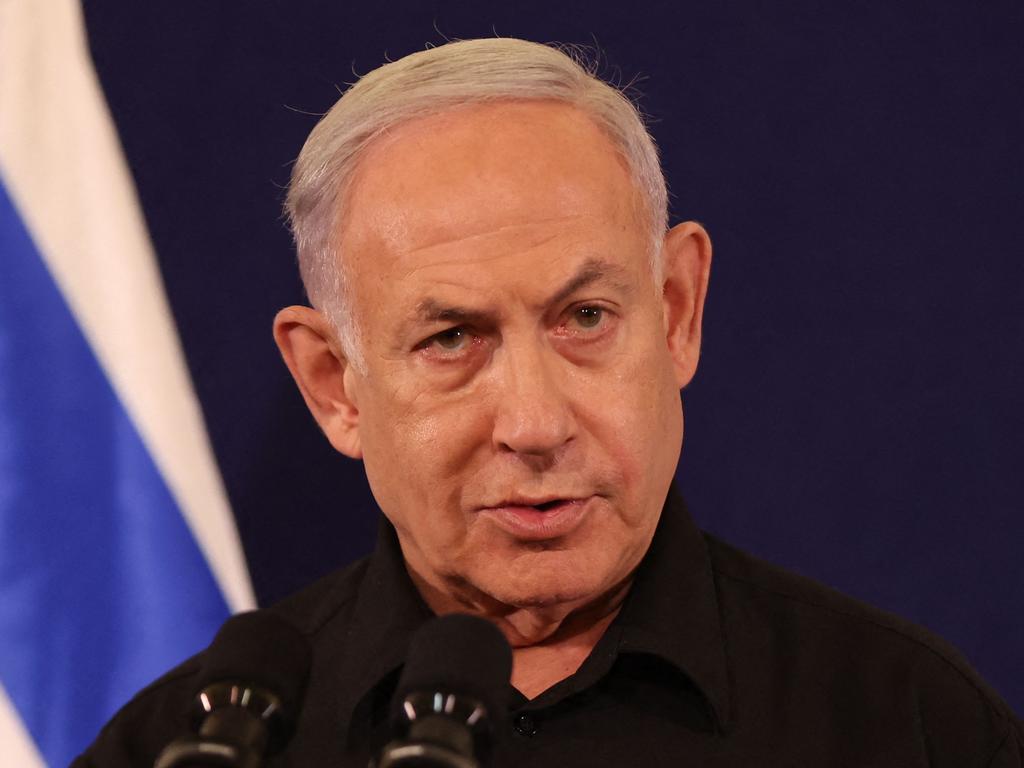


To join the conversation, please log in. Don't have an account? Register
Join the conversation, you are commenting as Logout